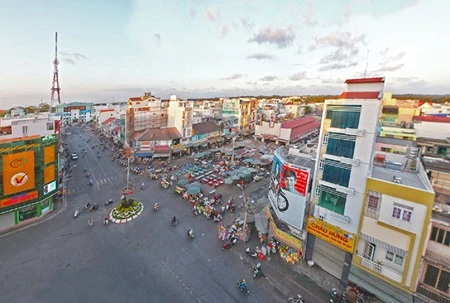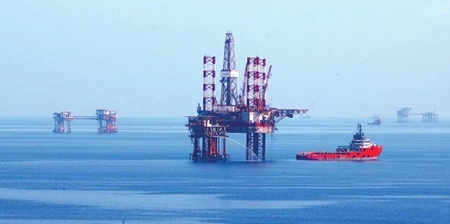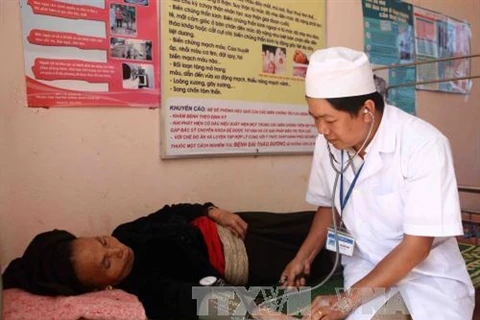Hanoi (VNA) – After 30 years of the ‘Doi Moi’ (renewal) procses, Vietnam has emerged from a backward country with 90 percent of its population working in the agricultural sector, to one that is well on its way towards industrialisation and modernisation, said VuongDinh Hue, head of the Party Central Committee’s Economic Commission.
The country has built material and technical facilities and socio-economic infrastructure, thus attracting financial and human resources for national development, Hue said.
During the reform period, Vietnam posted a markedly increased economic growth rate, compared with the previous era.
According to the official, after generating an annual gross domestic product (GDP) growth rate of just 4.4 percent in the early years of reform from 1986-1990, Vietnam’s economy experienced an impressive pace in the next nearly two decades, with 8.2 percent from 1991-1995, 7.6 percent from 1996-2000, 7.34 percent from 2001-2005 and 6.32 percent from 2006-2010.
During 2011-2015, due to impacts from the global financial downturn in 2008, and the European sovereign debt crisis in 2010, the country’s economic growth fell to 5.9 percent.But it was still much higher than that recorded by most other countries in the region and the world.
Vietnam’s per capita income rose sharply from 471 USD in 2001 -16 years after the ‘Doi Moi’ policy was initiated - to 2,300 USD in 2015. The country’s economic output was about 204 billion USD last year.
The country’s workforce has also made progresses in terms of both quantity and quality, the official said, adding that contributions made by the ‘total-factor productivity’ (TFP) to the national economic growth increased from 21.4 percent in 2001-2005 to 17.2 percent in 2006-2010 and 28.94 percent in 2011-2015.
The macroeconomy has remained stable and inflation has been under control, he stated.
Vietnam’s economic structure has been shifted towards modernization, with the percentage of contributions by agriculture to the overall economy decreasing and those of services and industrial production increasing.
Exports have frequently enjoyed double-digit growth, hitting an average of 18 percent over the last five years with a growing proportion of manufactured goods and a declining ratio of farm produce and raw materials.
Key economic regions and centralised industrial and economic parks have become main drivers of the national economy. But not over-looked, Vietnam has also established specialised agricultural production areas, in combination with industrial processing.
Over the past three decades, all economic sectors have made big strides. Industry and construction have maintained their noted growth thanks to the application of scientific and technological advances, and the development of new industries and high technologies.
Agriculture has experienced significant changes, transforming Vietnam from a food-hungry country to one of the world’s largest exporters of rice, coffee, rubber, cashew nuts and fisheries products.
The service sector has also flourished with a range of products like tourism, telecommunications, finance, banking and legal consultation.
The exploitation of natural resources and environmental protection have been aligned with sustainable development, producing initial good results.
Significant improvements have been seen in socio-economic infrastructure development, particularly in transport, electricity, telecommunications, urban areas, education and health care.
It can be said that the application of scientific and technological advances has created a foundation for the transition towards a knowledge-based economy, Hue said.
During the reviewed period, under the leadership of the Party, the policy of developing the socialist-oriented market economy has been institutionalised in various laws, which create a legal corridor for the economy to work effectively.
The laws testify that the economy has many forms of ownership and distribution, and that the State regulates the economy by market principles.
They also assert that Vietnam advocates ensuring social progress and equality - through socio-economic and environmental protection policies, as well as the country’s openness to regional and international integration.
State-owned enterprises have been restructured in line with the Corporate Law, resulting in a sharp fall in their number. Collective economic entities have adopted new forms of cooperation more suited to the market mechanism. Meanwhile, the private economic sector has witnessed a rapid rise in the number of enterprises and an improved performance,significantly contributing to job generation and national GDP. Foreign-invested companies have also been stimulated and have made significant contributions to the fulfillment of socio-economic development, job creation and export targets.
The financial and monetary markets have developed strongly and vibrantly. Along with the banking system,the birth of the stock market has contributed to diversifying investment capital resources.
In the meantime, the insurance market has helped stabilise production and people’s lives while mobilising capital for the national industrialisation and modernisation.
Thirty years of ‘Doi Moi’ has been seen as a journey of deep integration into the world economy at various levels and in tune with global principles and standards.
Vietnam has established relations with many economic strategic partners, constructively built the ASEAN Community and completed the domestic market in conformity with its commitments to the World Trade Organisation (WTO).
As a result, 59 countries, including many large trade partners, have to date recognised Vietnam’s market economy.
The country has signed ten regional and bilateral free trade agreements (FTAs), including six signed in its capacity as an ASEAN member country and four inked as an independent party. It has recently completed negotiations of two deals–the Vietnam-EU FTA, and the Trans-Pacific Partnership (TPP) agreement. It is also actively negotiating three other FTAs including those between ASEAN and Hong Kong (China) and between ASEAN and the European Free Trade Association (EFTA), and the Regional Comprehensive Economic Partnership (RCEP).
Vietnam has participated in three ‘value chains’ which play increasingly important roles in the global economy, covering food and food security,energy and energy security (oil, gas and coal), and garments-textiles and footwear.
Hue attributed these achievements to changes in the mindset of the Party on the inevitability of the development of a market economy, and the decision to transform from a centrally planned economy to a socialist-oriented market one.-VNA
























